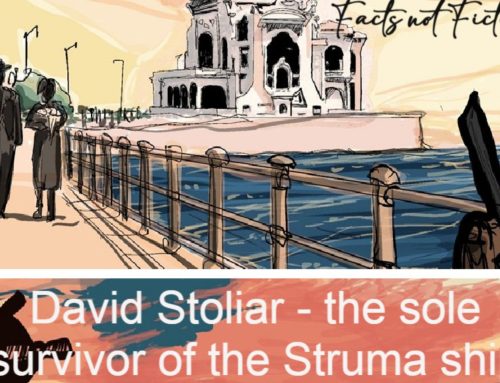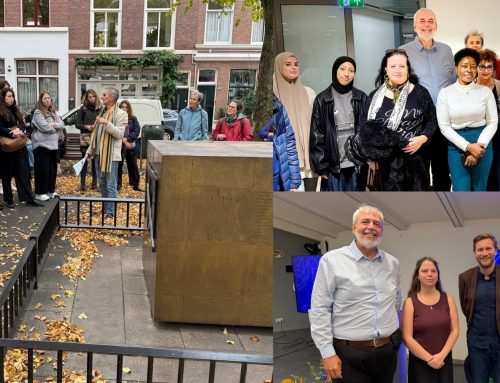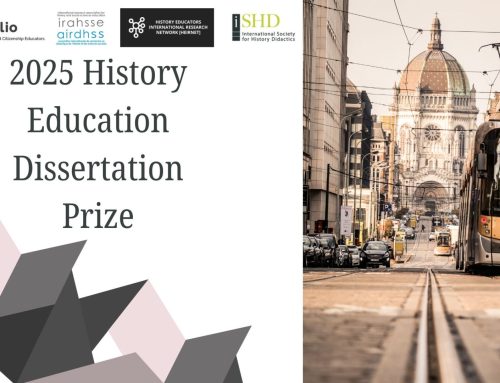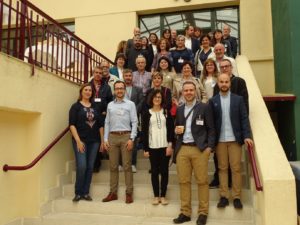
As part of the Decisions and Dilemmas 3: making learning about the EU motivating and meaningful project, the fourth national training event was held on the 8th and 9th of June 2018 in Madrid (Spain) and bore the title “Using new methodologies to teach Europe: This is not about treaties!”.
The event was organized by the Teacher Training and Innovation Department of the Autonomous Community of Madrid (Dirección General de Becas y Ayudas al Estudio, Subdirección General de Formación del Profesorado) and the Spanish Association of History and Geography Teachers. It revolved around debates and workshops that involved an active and participatory methodology in which the participating teachers and trainers exchanged their reflections and points of views about how to teach about Europe in a meaningful and motivating way.
The program opened on Friday with an official greeting from the Head of the Teacher Training and Innovation Department of the Autonomous Community of Madrid, Mr. Vicente Alcañiz, who highlighted the importance of history teachers in creating a multiperspective and inclusive historical narrative that allows students to understand the past and the present. Moreover, it helps students develop certain competencies and skills to exercise their European citizenship in a responsible and active way. Ms. María Jesús Campos, the national project coordinator, presented the project to the participants and introduced Ms. Concha Brea, deputy of the European Documentation Center in Madrid. Ms. Brea presented the activities developed in the Center, the materials they create, and finally their webpage, which is a very useful resource for teachers and European citizens, and which also presents updated news on the European Union. Furthermore, she introduced Team Madrid-Europe, a group of experts that give talks about the European Union to students from a non-teaching perspective. One of its members, Mr. Ignacio Velo, gave an example of the methodology they use.
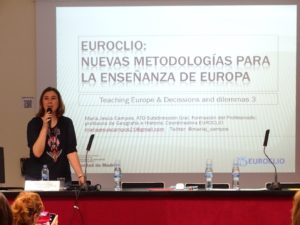
Closing the first day of activities were Mr. Alfredo Lopez, chair of the Spanish Federation of History Teachers, Ms. Isabel García-Velasco, chair of the Association of History Teachers of the Autonomous Community of Madrid, and Cristina Luz García, treasurer of the Association. They presented the respective organizations to the participants and discussed the importance for teachers to have a common space to share good practices and to reflect on their own teaching practice.
The following day, Saturday 9th of June, the location of the event was the Centre for Innovation and Training Madrid-Capital. The day kicked off with Ms. María Jesús Campos, a history teacher and national project coordinator, who presented the results of the research report on “Teaching Europe to enhance EU cohesion”. By means of an active workshop, the participants reflected on the ways teachers currently teach Europe and on the materials used in the classroom, while establishing comparisons with the results from the “Teaching Europe” research. This activity gave the framework for the rest of the event, in which the materials developed in the “Decisions and Dilemmas” project were going to be experienced.
The first workshop based on materials from Historiana was held by Mr. Guillermo Balmori, a history teacher in Ntra. Sra. de las Escuelas Pías (Madrid) on “The challenge of European stability”. Participating teachers experienced the materials and reflected on how to implement them in the classroom using a new approach that brings the past to the present and allows students to think critically about their world and how it is created.
The second workshop was given by Mr. Marino Maqueda, a history teacher in IES Cervantes (Madrid) and also EuroClio’s international trainer. This workshop focussed on “Life and Leisure: the history of ordinary people – I was a soldier in the German army – How did WW2 affect the life of an ordinary teenage boy?”. This unit deals with the repercussions of violent conflicts in ordinary people’s lives and focusses on the case-study of Igor Slavec. To make it more meaningful for Spanish teachers, the workshop addressed the life story of Tomás Fidalgo Marzagón in the context of the Spanish Civil War. This material can also be found on Historiana’s “Changing Europe” unit. Comparing Igor Slavec’s and Tomás Fidalgo’s stories, participants were able to find out similarities in how different conflicts have negative repercussions on the people affected by them.
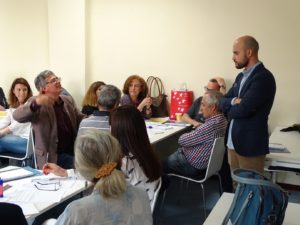
Mr. Edgar Berzins, EuroClio’s international trainer and history teacher at Upitis Skrivery Secondary School in Latvia, conducted the third workshop on “The European Union and trade in the global context – How does European trade policy affect African chicken farmers?”. This unit deals with the consequences of EU trade policies and the moral and ethical issues connected to it. Having a Latvian teacher enriched the event, as Mr. Berzins gave an additional short talk to explain participants the path followed by Latvia to become a member of the EU, and which challenges the country is currently facing.
During lunch, participant teachers and trainers had the opportunity to engage in informal talks to get to know each other, share their impressions about their teaching practices and the materials they were using, and create networks to establish future collaborations.
In the afternoon, a plenary session was organized on “European Programs: Opening your classroom to Europe”. Ms. María Ángeles Heras from the Teacher Training and Innovation Department explained how to participate in programmes such as Erasmus+ and eTwinning, and highlighted the advantages for schools when participating in such international exchanges and environments.
Then, Luis Horrillo, Vice-Chairman of the Spanish Association of History Teachers, introduced Historiana. Participating teachers discovered the resources and materials on display and how these materials can be downloaded and modified in order to adapt to the student’s needs. They were also familiarized with the possibilities the page offers to create and share e-Learning activities.
The final plenary session consisted of a debate among trainers and participants with the aim of evaluating the two-day event and the information and materials presented. The feedback was very positive, as the participants praised the organization of the event, as well as the methodology and materials developed through EuroClio’s “Decisions and Dilemmas” project. All of the participants highlighted the presented new approach to the study of the European Union as very useful to transform this community of countries and peoples in something real and meaningful for students, and to develop competencies, skills, and self-perceptions that allow students to feel as European citizens and further develop their European citizenship actively and responsibly.
Moreover, the event was praised because it created a meeting place for teachers from all over Spain who usually do not have the opportunity to share impressions and create networks with teachers outside of their regions.
The Teacher Training and Innovation Department of the Autonomous Community of Madrid in collaboration with the Spanish Association of History and Geography Teachers and the Association of Madrid, considers the event a success as it has delivered Spanish teachers a new approach and methodology to teach and learn about the European Union, has provided a meeting point for teachers to reflect on their teaching practices and to think clearly about the history curriculum and the materials used to deliver it, and has fostered the creation of networks among Spanish history teachers.
This article is based on the report written by history teacher and national project coordinator María Jesús Campos, and the pictures were taken by Paz Jorge.










